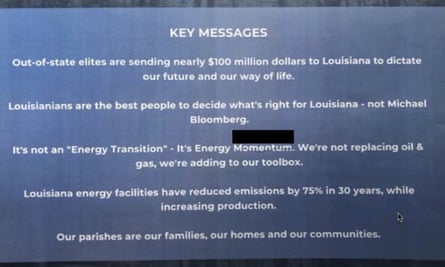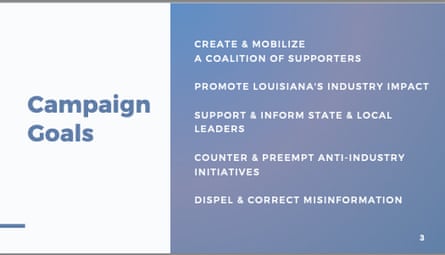After residents of America’s “Cancer Alley” in Louisiana put a national spotlight on their fight for a healthy environment, the state’s economic interests and petrochemical giants are backing the creation of a new “sustainability council” to counter grassroots activists, documents show.
In recent years, the activists have successfully fought construction of two multibillion-dollar plastics facilities and what would have been the nation’s largest methanol plant. The growing concerns have caught the attention of the Environmental Protection Agency, which earlier this year sued a manufacturer of neoprene in the state for not doing enough to reduce its cancer-causing air emissions.
Now, those same groups are receiving millions of dollars from Michael Bloomberg and his Beyond Petrochemicals campaign, and the Louisiana energy and chemical companies along with the states’ business-boosting groups have, in turn, created the Louisiana Industry Sustainability Council – originally called the Industry Defense Council.
“If they could do this with no money, imagine what would happen if they in fact had money,” said Beverly Wright, founder and executive director of the Deep South Center for Environmental Justice, one of the recipients of money from the Bloomberg campaign, an $85m effort in Louisiana, Texas and Pennsylvania targeting 120 new proposed petrochemical facilities. “They should be scared.”
Matt Wolfe, vice-president of communications at Greater New Orleans Inc, one of the groups leading the sustainability council, said the council wasn’t created in response to any specific project.
“The members of the group are not acting out of fear, but rather, the recognition that it is important that we inform a balanced, fact-based discussion, and one that recognizes that the best future for Louisiana is one that takes into account both the economy and the environment,” Wolfe wrote in an email to Floodlight.
When asked if the council was created out of fear because of the activists’ recent successes, a representative of the Baton Rouge Area Chamber, one of the other groups leading the council, said: “Not that we’re aware of.”
“We believe that it would be a horrible missed opportunity for the people of Louisiana to lose out on this brighter economic and environmental future because of the efforts of some to halt this progress,” said Michael DiResto, executive vice-president of the Baton Rouge Area Chamber, who also highlighted that $20bn of energy transition and carbon emission reduction investments are in development for the region.
But slides and strategies from early meetings of the group, shared with Floodlight, specifically highlight Bloomberg and efforts to counter the “small, but influential groups”.

Proposed development includes dozens of proposed carbon capture and storage, hydrogen, and ammonia projects. Opponents of those proposals question their effectiveness to reduce carbon emissions and their impact on the communities that have already been harmed by the petrochemical industry.
According to a 21 April presentation by Greater New Orleans Inc, the mission of the council is to “protect and grow safe and responsible community jobs and prosperity in Louisiana”.
The group consists of about 60 representatives, including from Chevron, Dow, Entergy, BASF and ExxonMobil, alongside leaders of parishes in Cancer Alley. Other members include economic development groups, law firms and public relations agencies, according to a list that was posted on the website of Greater New Orleans Inc.
The list also includes a representative from LCMC Health, a regional nonprofit hospital chain that owns the children’s hospital of New Orleans. A spokesperson from LCMC says the chain does not have representation on the council, and the member listed, Bub Millet, is representing a local chamber of commerce.
The sustainability council, according to documents shared with Floodlight, says the opposition comes from a “small universe of vocal industry opponents” that have caught the media’s attention and are creating an echo chamber of misinformation.
Asked to characterize the misinformation, Wolfe said, in general, the activist groups and the media focus “only on the negative, and not on the positive impacts of industry on jobs, or on improving environmental outcomes”.

One presentation highlighted the industry’s economic impact in the state. “Moreover, industry has committed billions to investing in further improvements in environmental outcomes,” Wolfe said.
But, as Wright of the Deep South Center points out, the state also has some of the worst pollution in the US, and it has the second-highest rate of new cancers in the nation.
At the 21 April briefing, a Greater New Orleans Inc representative told those in attendance: “We want to provide a pathway for industry to continue to operate.”
According to that presentation, the group wants to create and mobilize supporters, promote Louisiana’s industry impact, counter anti-industry initiatives, and dispel and correct misinformation.
The Greater New Orleans Inc representative explained the group plans to put up billboards and create TV and radio ads and a social and web media presence to demonstrate how industry provides value to the state.
According to documents shared from from earlier meetings, the council’s outreach is intended to inform the public and educate industry employees and retirees “and point them in the right direction to do something”.
Some of the council’s documents say the group will not be able to put forth its own reciprocal $85m to counter Bloomberg’s money. But the group has laid out $1m-plus in an effort to not only advertise, but also support political candidates and create online polls.
Another strategy, according to the document, is to “reinforce the resolve of parish officials”. Wolfe says the intention of that strategy is to make sure that elected officials have all of the information necessary to make decisions.
The Bloomberg money was an early target of the sustainability council and, according to a slide showing its key messages, it planned to promote the message that “Louisianans are the best people to decide what’s right for Louisiana – not Michael Bloomberg.”
Wolfe says the suggested message point about Bloomberg has been rejected by the council.
Another early council strategy highlights that “Louisiana’s future comes first. Point out repeatedly that these are out-of-state interests trying to punish Louisianans into submission.”
Jo Banner, co-founder and co-director of the Descendants Project in St James Parish, and a Bloomberg grantee, finds any concerns of out-of-state interests ironic.
“You can go and stand on the levee and look at all the outside money and all of the pollution up and down the river,” she said. “Why is that outside money now a knock against us?”
This article was a collaboration between Floodlight and the Guardian
